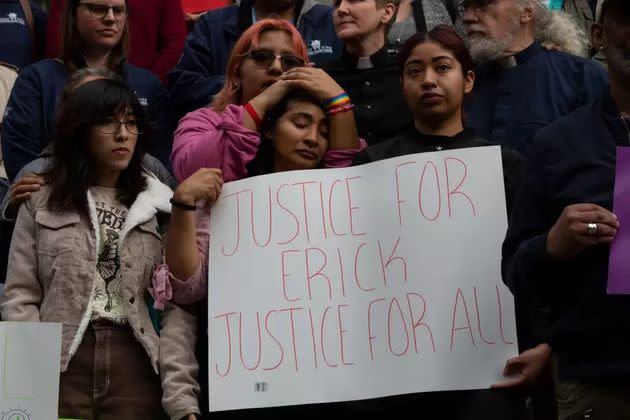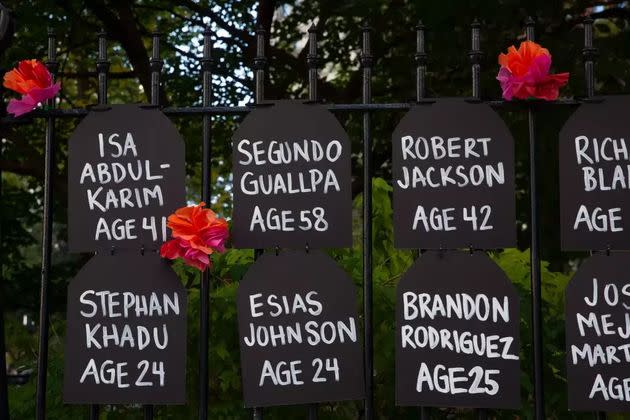New York City Jails No Longer Announcing Deaths After Horrifying Wave Of Fatalities

Advocates for criminal justice reform held a protest outside City Hall against deaths on Rikers Island, Nov. 3, 2022.
This story was originally published at The City.
The city Department of Correction has abruptly stopped notifying the media when an incarcerated person dies and will no longer do so in the future.
“That was a practice, not a policy,” said new DOC chief spokesperson Frank Dwyer when asked about the lack of public notification about recent deaths behind bars. Dwyer took over the department’s press office a few weeks ago following a similar role at the Fire Department.
Over the past two years, the department’s media team would issue a press release announcing the death of anyone behind bars. The release typically included basic information like the person’s name, housing facility, date and time of death.
But over the past two weeks, the DOC has failed to notify the public about at least two deaths, including those of Rubu Zhao, 52, who died after he allegedly jumped from an upper tier of a specialized unit on Rikers for people with mental illness on May 14, and of Joshua Valles, 31, who died on Saturday suffering from a fractured skull that officials first internally labeled as a heart attack.
Valles had been given a “compassionate” release out of DOC custody days before his death.
The department is taking a step in the wrong direction with its new death notification practice, according to Stanley Richards, who spent time at Rikers as an inmate in the 1980s and later served as the department’s deputy corrections commissioner during the last six months of former Mayor Bill de Blasio’s administration in 2021.
“This administration is going back to the way in which jails were managed decades ago. They are closing ranks,” said Richards, now vice president of the Fortune Society, a nonprofit that seeks to help current and formerly incarcerated people.
“I think it’s part of a series of attempts to isolate the jails from scrutiny to control the narrative,” said Kayla Simpson, staff attorney with the Prisoners’ Rights Project at The Legal Aid Society.

At City Hall, supporters and the family of Erick Tavira protested his death on Rikers Island, Oct. 25, 2022.
Under the Adams administration, the department has also blocked real-time video surveillance access from Rikers and other city lockups to members of the Board of Correction, which oversees the agency.
Dwayne Sampson, the new chair of the board appointed by Mayor Eric Adams in September, also attempted unsuccessfully to reduce the number of public meetings annually from nine to six.
Dwyer noted that all jail deaths are reported to the department’s health affairs unit, special investigation team, chaplain and legal team.
The city’s medical examiner is also contacted as well as the state Attorney General’s office and the state’s Commission of Correction, Dwyer added.
Monitor in the Dark
The change in the DOC’s death disclosures comes as the federal monitor overseeing the department has criticized Correction Commissioner Louis Molina and his team for failing to properly inform them about a recent death — and four other “serious and disturbing incidents involving harm to incarcerated persons.”
In a special report released Friday, federal monitor Steve Martin wrote he had to rely on media reports, including one from THE CITY about a detainee who had been placed on a ventilator for two weeks and is now paralyzed from the neck down after being tackled by guards.
Molina had tried to keep the special report under wraps, telling Martin it would “cause great harm to the department when we are making great strides.” He also argued it would “fuel the flames of those who believe we cannot govern ourselves,” the report said.
On Wednesday, federal judge Laura Taylor Swain, who has overseen the long-running case that installed the monitor, scheduled a special hearing in two weeks to address concerns raised by the monitor.
The Legal Aid Society and other lawyers representing plaintiffs in the Nunez v. City of New York case that led to the monitor’s appointment hailed the new hearing.
“The attempts to hide the shocking brutality described in the Monitor’s reports … cannot be countenanced,” the city’s largest defender organization said in a statement.
Legal Aid, several citywide elected officials, and jail activists have for months been urging Swain to appoint a receiver — an independent manager — to take over the troubled Correction Department.
Also Wednesday, in a new letter to the judge, Martin slammed the department’s handling of Valles’ death.

Protesters attached tombstone-shaped signs with the names of people who died on Rikers Island to a fence outside City Hall, Nov. 3, 2022.
The man had been housed in a specialized medical unit on Rikers when he complained to medical staff about headaches on May 20, according to the letter from the monitor to Swain.
Valles was then brought to Elmhurst Hospital where his condition worsened and he was placed on life support, the report said. Jail officials did not record his transfer to the hospital in the department’s so-called 24-hour report, the monitor said.
Instead, officers on duty noted the move in a handwritten note inside a physical logbook kept on Rikers. The city’s Department of Investigation in March 2019 recommended that the Correction Department totally digitize its record keeping system after concluding jail officials significantly undercounted dangerous incidents.
The monitoring team only heard about Valles’ case two days after he was in the hospital, according to Martin’s Friday special report: Jail officials had told Martin that Valles appeared to suffer a heart attack and that there was no foul play suspected.
Martin also wrote that Molina himself said “there was no official wrongdoing” and “they know of no other details about the case,” the monitor’s report said.
But an autopsy revealed that Valles suffered a fractured skull, according to Martin’s latest letter.
Valles was in a fight with another incarcerated person “over a month ago” but there were no reported injuries, according to jail officials.
“This serious and disturbing update only reinforces the Monitoring Team’s concerns about the management of this individual … and any potential reporting irregularities or failures that may or may not have occurred,” Martin said.
He also questioned how Molina had so quickly concluded there was no wrongdoing.
“There is no question that investigation of this incident is necessary and that the Commissioner’s conclusions about this incident reported to the Monitoring Team are premature, at best,” Martin said.
Family Shut Out
One woman who has gotten no answers from the Correction Department is the sister of James Carlton, who was gravely injured and put on a ventilator on May 11 after being tackled to the ground twice by correction officers at the city’s Vernon C. Bain detention center, known as the floating jail.
Martin’s special report last week revealed that Carlton, 40, “has since undergone three surgeries and … is now paralyzed from the neck down.”
Nyasia Bankston, his sister, said she tried to visit him in Lincoln Hospital in The Bronx over the weekend but was blocked from entering his room by correction officers.
“They wouldn’t let me see him,” Bankston told THE CITY, noting that the officers also did not give her any information on how to set up a visit.
Latima Johnson, a department spokesperson, said on Wednesday that family visits to hospitals that are not “DOC outposts must get prior approval from the facility warden.”
Johnson did not respond when asked who was the warden in charge of that hospital or how Bankston or other family members could contact that supervisor.
Bankston said she was only told about her brother’s plight by his lawyer, Dean Vigliano. “My heart fell to my stomach,” she said.
She added that she had been friends with Layleen Polanco, a 27-year-old transgender woman who died from a seizure on June 7, 2019, after spending nine days in solitary confinement at Rikers’ Rose M. Singer Center, where she was being held in lieu of $500 bail.
Jail officials had told Martin that a pre-existing condition Carlton had was exacerbated when “he fell trying to tie or put on his shoes” — without any mention of officers tackling him while he was shackled, according to the special report.
He’d been in jail for the past six months on robbery and assault charges following an arrest on November 7. He was remanded without bail, court records show.
Before the confrontation with officers, Carlton’s lawyer had asked the court to conduct a mental health evaluation, known as a “730,” court records show. The results from the review conducted earlier this month have not been released yet.
His sister said he was diagnosed as bipolar with schizophrenia when he was younger.
“He was on all kinds of meds,” Bankston said. “He had a lot of issues.”
She remembered last seeing her brother during a family get together in 2019 after he was released from a prior stint in jail.
“He was so different,” she said. “His mind was different. I could tell instantly that he was institutionalized. He was forgetting stuff. He just wasn’t the person I knew from younger.”

 Yahoo News
Yahoo News 